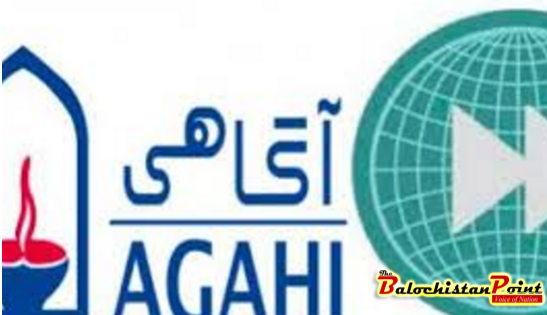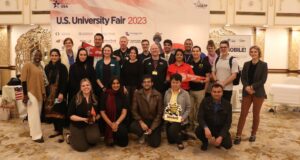Quetta: The consultative session on Pakistan – State Of Future Index (PK-SOFI) engaged academia, media, think tanks, and political parties in an immersive dialogue on the country’s past, present and future(s). The participants outlined key variables that the lab needs to pursue in developing the Pakistan – State of Future Index. The Pakistan – State Of Future Index will help the decision-makers chart possibilities focusing on creating newer opportunities by strengthening institutions’ capacity, producing quality futures research and policy designs.
The next generation of leadership needs to champion futures, Puruesh Chaudhary, Founder and President AGAHI, said, “Foresight Lab in Pakistan is uniquely positioned at the crossroads of where academia contributes to thought experiment which connects to the country’s think tanks; a novelty in itself from which the decision-makers can benefit greatly. The Lab will publish the first annual Pakistan – State of Future Index later this year.”
The sessions included: State of Future Index, historical patterns and trends, importance of data, the dominating Worldview of Pakistan, internet imperatives and tool-kits, creating alternate realities through gaming and design thinking, narrative trap.
Dr. Shahid Mahmud, Chairman and Group CEO Interactive Group of Companies while speaking on the occasion about the winning combination said, “One of the gravest challenges we face today is the poor quality of human thinking in a society that is rapidly changing. The Foresight Lab is therefore an effort that connects the thinkers, the researchers, the professionals and the political leadership to contribute towards creating opportunities for the collective good which will help us navigate through uncertain times with a relative degree of clarity.”
The session explored the methodology of Pakistan’s State of Future Index. Millennium Project a Global Futures Studies & Research participatory Think Tank highlighted the importance of selecting the right variables and their role in making future related conversations more concrete to set realistic objectives.
Gerome C. Glenn, CEO The Millennium Project, said “the speed of technological change, integration of technologies, artificial intelligence – the more intelligent it gets the faster it gets, and the fact that Internet did not exist in the previous transition, and population growth of over two billion people within the next generation are new compared to the past changes. He stressed on the need to explore new kinds of economies such as the self-actualization economy further adding that with each change, agricultural age to industrial and then to information age, created more jobs than replaced.
The Pakistan – State Of Future Index (PK-SOFI) is set to measure the changing state of the future and showcase whether conditions nationally promise to get better or worse. The process to determine PK-SOFI is being applied for the very first time in Pakistan. The methodology used to study future index has been already applied by countries like South Africa, Korea, Turkey, and Venezuela.
Futures thinking facilitates the process of institutionalized decisions amongst the leadership corridors as an on-going deliberative practice looking at both medium and long-term implications of a policy action. This improves learning faculty and increases the quality of policy inputs and strategic outcomes – ultimately reducing the chances of policy failures.
Academicians from leading universities Allama Iqbal Open University (AIOU), Quaid-e-Azam University (QAU), National University of Modern Languages (NUML), International Islamic University Islamabad (IIUI), Institute of Management Sciences (IMS), COMSATS Institute of Information Technology, Preston University, National Defence University (NDU), Air University, and Bahria University; representatives from think tanks, Strategic Vision Institute (SVI), Institute of Policy Studies (IPS), Mishal Pakistan and Center for Global & Strategic Studies (CGSS) attended the dialogue. The session also included country’s political, national security, health, infrastructure, social, economic, legal, and media experts.
AGAHI in collaboration with its local partner Interactive E-Solutions is devising a customized model for computing Pakistan’s futures discourse which will have the ability to track the expected state of the future over time at National, Provincial and District levels. Eikon7, AGAHI’s design partner is developing the interface for the end-user.
AGAHI is a not for profit organization established in Islamabad in 2011 under the Society Registration Act 1860. Its primary function is to create non-paid communication strategies, content intelligence structures, development collaterals and tools for diverse sectors and organizations. AGAHI encourages and advises individuals and institutions in pursuing and supporting initiatives to improve the state of development in Pakistan. It works on developmental frameworks facilitating information and knowledge sharing platforms on understanding challenges in global perspective. Its research work mainly focuses on national and international security, ICT, competitiveness, human security, and governance. AGAHI in association with several leading national and international partners focuses on creating shared spaces for interactive learning, collaborative thinking, and knowledge sharing. It is at the forefront of devising foresight research and future scenarios work in Pakistan. AGAHI works with highly motivated and qualified professionals who have substantial experience in learning and leadership development.
Staff Reporter
Published in The Balochistan Point on January 14, 2017
 Balochistan Point Voice of Nation
Balochistan Point Voice of Nation




